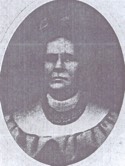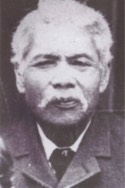Farm Family - Person Sheet
Farm Family - Person Sheet
Spouses
ChildrenEmelia , F (1876-1921)
Mary , F (1878-~1903)
George , M (1879-~1885)
Elizabeth K. , F (1882-~1901)
Annie , F (1884-1920)
Susannah , F (1887-1934)
George K. , M (1889-1942)
Lillie , F (1891-1920)
Samuel Ho'olohekamohoali'i , M (1894-1969)
Lucas Puanani , M (1897-1955)
Keahiulaokalani , M (1899-1899)
Christina Kainoakupuna , F (1900-1921)
Lizzie Kanehuliaimoku , F (1903-1919)
Notes for Elizabeth Kaililau Kaale PALEA
-Kaililau: Means: “the source who protects and strengthens the ‘ohana and through whom the inheritance passes”.1595
Notes for Lucas Puanani (Spouse 1)
-Went to Guam when he was a little boy. Landed in Kona on a whaling vessel at age 18 in 1862. Bought land in Hakalau for $25.00/acre. Was a Stable Boss for Hakalau Plantation.1444
-…cabin boy who now had more than twenty years on the seas, keeping the captain’s books, taking care of the captain’s personal effects, and writing and translating business documents. A speaker of English and Spanish, Lucas Lujan Sr. left home at age nine in 1854. Over the years, Lucas had become a favorite among the cabin boys that the captain had employed in his many years running a route from Spain to China. The journey began in Spain, tacking toward the Ladrone Islands in the South China Sea, then slipping around the southern tip of Tierra del Fuego in South America to the cape in the South China Sea, and heading full speed to Hawai’i before finally docking in China. The ship always carried European goods in its cargo and Hawai’i sandalwood and food to China. In its return trip, the ship bore Chinese merchandise and silk back to Europe. The stops in Hawai’i and the Ladrones were especially necessary to get fruits and other food that staved off the sailor’s disease, scurvy. The Ladrones were discovered by Magellan in 1521 and claimed by Spain in 1667. Lujan was born on Guam. His parents were among the Spanish who colonized the Ladrones after 1667. Guam was the largest among the Ladrones, and the islands had become a key stop for the Spanish galleons—large trade ships capable of long voyages through rough weather—in their trade route from Spain to Acapulco and the Philippines. They were armed, and they left many a pirate ship listing on the high seas. They were also a hiding place for pirates that sailed the South China Sea. Ladron means “thief” in Spanish, so the islands became known as the Ladrones.1598
-Lujan had come to meet the local doctor, Dr. Trask, an Englishman who had built quite a practice, especially among the sailors and other English speakers of the area. He was in need of a houseboy to handle medical statements and records and provide general assistance to his growing practice. It was a good fit for Lujan’s skills: he had sailed with the captain for nearly twenty years, had done the ship’s record keeping…1599
-He was now a professional and respected accountant and occasional paniolo. And he was, after all, an espaniolo. He spoke several languages, was an admired conversationalist, and his voice was mellow; it drew attention in a crowd or in intimate soliloquy and every day chats. Most notably, he had a way with women. In a short time, he was to become a farmer of seven acres in Waiki’i…The birth right for commoners translated into seven acres or less for a blood kanaka, (Lucas’ wife Kaililau).1600
-…cabin boy who now had more than twenty years on the seas, keeping the captain’s books, taking care of the captain’s personal effects, and writing and translating business documents. A speaker of English and Spanish, Lucas Lujan Sr. left home at age nine in 1854. Over the years, Lucas had become a favorite among the cabin boys that the captain had employed in his many years running a route from Spain to China. The journey began in Spain, tacking toward the Ladrone Islands in the South China Sea, then slipping around the southern tip of Tierra del Fuego in South America to the cape in the South China Sea, and heading full speed to Hawai’i before finally docking in China. The ship always carried European goods in its cargo and Hawai’i sandalwood and food to China. In its return trip, the ship bore Chinese merchandise and silk back to Europe. The stops in Hawai’i and the Ladrones were especially necessary to get fruits and other food that staved off the sailor’s disease, scurvy. The Ladrones were discovered by Magellan in 1521 and claimed by Spain in 1667. Lujan was born on Guam. His parents were among the Spanish who colonized the Ladrones after 1667. Guam was the largest among the Ladrones, and the islands had become a key stop for the Spanish galleons—large trade ships capable of long voyages through rough weather—in their trade route from Spain to Acapulco and the Philippines. They were armed, and they left many a pirate ship listing on the high seas. They were also a hiding place for pirates that sailed the South China Sea. Ladron means “thief” in Spanish, so the islands became known as the Ladrones.1598
-Lujan had come to meet the local doctor, Dr. Trask, an Englishman who had built quite a practice, especially among the sailors and other English speakers of the area. He was in need of a houseboy to handle medical statements and records and provide general assistance to his growing practice. It was a good fit for Lujan’s skills: he had sailed with the captain for nearly twenty years, had done the ship’s record keeping…1599
-He was now a professional and respected accountant and occasional paniolo. And he was, after all, an espaniolo. He spoke several languages, was an admired conversationalist, and his voice was mellow; it drew attention in a crowd or in intimate soliloquy and every day chats. Most notably, he had a way with women. In a short time, he was to become a farmer of seven acres in Waiki’i…The birth right for commoners translated into seven acres or less for a blood kanaka, (Lucas’ wife Kaililau).1600
Notes for Lucas Puanani & Elizabeth Kaililau Kaale (Family)
-…the child bride was thirteen, and Lujan was thirty-two.1601




